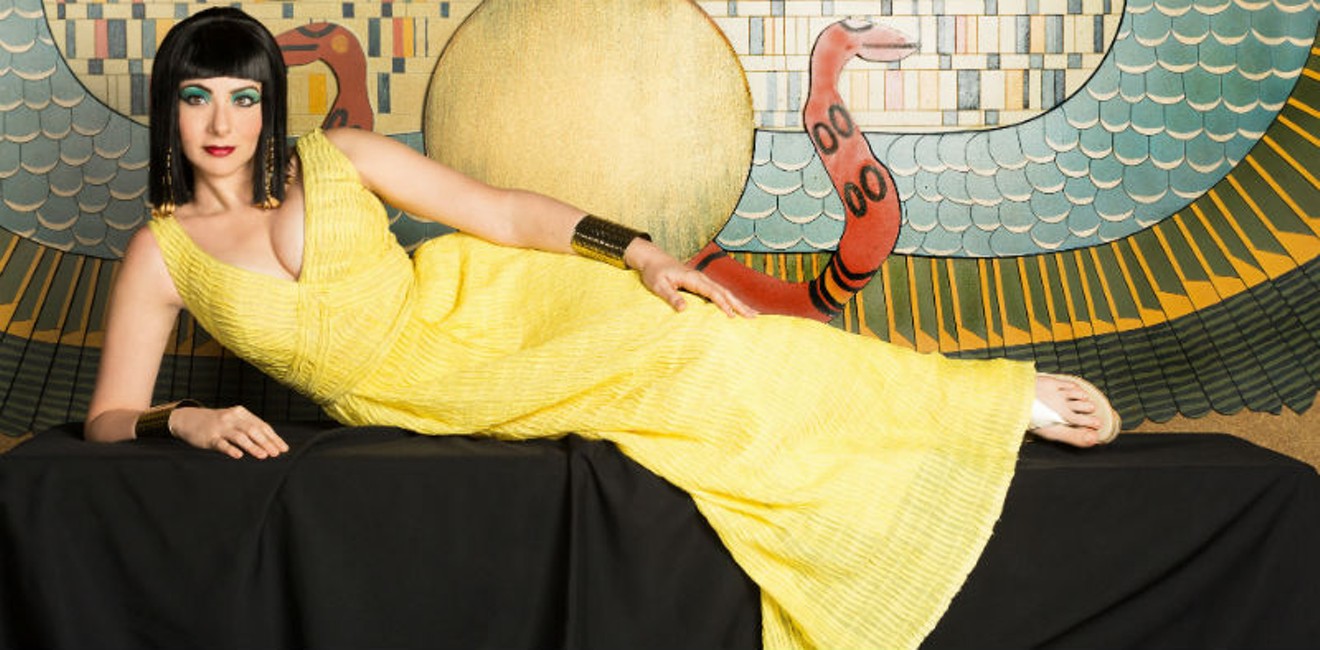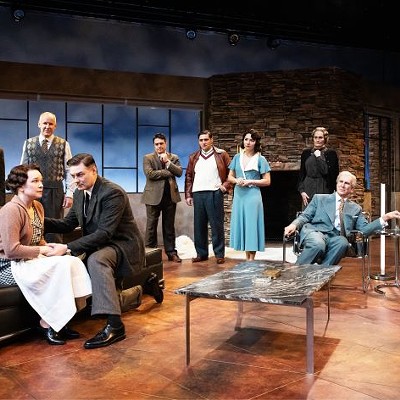By his own account, playwright and Pulitzer-Prize winner Lawrence Wright (for the mesmerizing non-fiction account of the rise of Al-Qaeda, The Looming Tower) had written 87 drafts for Cleo, now having its world premiere at the Alley Theatre. He needs to write No. 88.
Cleo is a somewhat fictional account of the scandalous saga of the making of the last of Hollywood's grand epics, Cleopatra (1963), which starred a luxuriantly dressed Elizabeth Taylor, as the last queen of the Nile, and her soon-to-be new husband, the tempestuous Welshman Richard Burton, as overachieving Roman general Marc Antony, partial heir to Caesar's empire and all of his Alexandrian bed. The Burton/Taylor adulterous affair (both married at the time) sparked international outrage, frenzied condemnation, and unprecedented tabloid attention. If Hollywood was dying, this was its ironic last gasp: two movie stars who said to hell with what anyone thinks, we're doing whatever we please.
Had their affair happened during the making of any other movie, it might have been overlooked, but it occurred smack in the middle of the biggest movie ever made up to that time, a movie cursed at its inception for its bloated budget, wasteful extravagance, and prodigal inefficiency. Although everyone involved was a veteran Hollywood pro, it seemed as if Cleopatra was being produced by stoned high school film students.
That the movie turned out as good as it did was due to the post-production tinkering of Darryl F. Zanuck, former Twentieth Century-Fox founder, whose film instincts were more honed than MGM's legendary Irving Thalberg. He salvaged the movie with re-shoots and judicious editing, bringing Joseph Mankiewicz' six-hour leviathan down to a somewhat reasonable four hours and six minutes. Except for the heated internal sexcapades of Liz and Dick, which eerily paralleled their ancient counterparts, the movie stayed cold.
There's an uneasy balance between the DeMille vistas and Mankiewicz's psychological probing of the characters: too modern and not ancient enough. It's still a beauty to behold, though: lush saturated colors; incredibly sweeping panoramas that march into the horizon; an unparalleled Alex North score full of rhythm, sistrum, and grand Hollywood style; and Rex Harrison, who walks away with the picture as wily old conqueror Julius Caesar, a mix of pragmatic Shavian wit, DeMille urbanity, and a big dash of Henry Higgins. He dies at the end of Part I, and the movie never recovers from his absence. Caesar's the most Mankiewiczian character since Margo Channing in All About Eve: diva, bitch, Circe, and Odysseus, just your average god lookin' for love.
Wright pares away the spectacle and most of the movie's troubles to focus on the celestial/earthy pairing of Taylor and Burton. Joseph L. Mankiewicz (Brian Dykstra) with his ubiquitous pipe shows up to direct a few scenes, but he's a cipher guru. Overworked because he hadn't finished the script, he relied on uppers and injections to keep him going. His affair with script supervisor Rosemary Matthews, whom he later married, was once the featured conflict in Wright's prior drafts. Now, Joe comes and goes, mainly to be a foil for Rex Harrison's prissy queen (a very droll Mark Capri, who seems to be holding a martini under his toga.) Sure, Harrison was upset when his dressing room trailer got downsized and his chauffeur was denied living expenses after Fox's accountants deemed them unnecessary expenditures, but he also realized what a cushy job he had fallen into. He was kept on payroll for months when he was never once called to the set. When he subsequently put his sandal-clad foot down, his trailer and chauffeur were quickly returned.
It's fun to watch the seduction, the drunken pawing, the raucous sex played for laughs, but there's not much else here in version No. 87 to get excited about.
Crooner Eddie Fisher (a superlative Adam Gibbs), Liz's fourth husband who left actress Debbie Reynolds for Liz's more bounteous charms, is written as a patsy, a comedy sad sack. He has three songs (two too many), although Gibbs is a mighty accomplished singer, but we get the wry set-up after song No. 1. The comedy payoff diminishes with each singing entrance. Fisher is written like he stepped out of Jersey Boys, but Gibbs wisely overlays a tender touch that's oblivious to Wright's ham handedness.
There are moments when the angle of David Weiner's lighting frames Lisa Birnbaum's face just so at her makeup table, that you'd swear you're seeing Elizabeth Taylor in A Place in the Sun or Cat on a Hot Tin Roof. At times the resemblance is uncanny and luminous. There's a bit of Taylor's girlish giggle in her voice and a lot of her slatternly laugh that she used to great effect later in Who's Afraid of Virginia Woolf. But what does Wright show us? What do we learn about Taylor that a thousand Photoplay magazines haven't told us?
Groomed for stardom as a child at MGM when she was a preternatural beauty, she became the ultimate movie icon, probably its last. Never out of the limelight or glare of photographer's flashbulbs or publicists' fantasies, Taylor grew up in the movie factory and became as warped as Norma Desmond. She shed husbands and lovers (she and director Joseph Mankiewicz had a brief fling at MGM in their early days), threw tantrums when she didn't get her way, reported late on the set, adored the camera as much as it adored her, and demanded as much as she could get. She played diva like the screen goddess she was. She knew her worth and threw her weight around, daring anybody to stop her. Richard Burton became her spike strip.
Nothing of this story is told in Cleo. Instead, we get the standard Hollywood feel-good version: lonely little girl star, now all grown up, waiting to be loved for who she is. There's no variation, no suspense. She's tailor-made.
But it's Richard Short, as Burton, who combusts this conventional Hollywood tale. What spark and fire he brings to the tale. He looks a little like Burton – a lot better in armor – and at times his deep baritone matches Burton's rotund, chasm-deep voice. He shows the ham and the little boy lost, and also the publicity hound waiting to break out. He knows the value in loving Elizabeth Taylor and having his picture circulated around the globe. He's willing to pimp himself for the fame. He's met his match with this royal American icon. Here's someone who will drink with him, over-drink with him, and give him a run for his money in bed. The relationship frees him, completes him. And Short gambols with this role – cajoling, flattering, brawling, purring – to get Elizabeth into the sack. That he falls hopelessly in love with her is no surprise. It's already part of the myth. Short is exceptional.
Acclaimed actor and director Bob Balaban (you'd immediately recognize his nebbish face from Close Encounters of the Third Kind, Best in Show, The Grand Budapest Hotel) tries to conceal Wright's padding, employing the trapdoor and side/front entrances as often as possible for comic effect, but he can't hide the play's surface-only emotions. There's no depth or much introspection, except that which Hedda Hopper might provide.
Alejo Vietti's costumes resemble those Academy Award-winning designs by Irene Sharaff, Vittorio Novarese, and Renie; Richard Hoover's temple door set is awash in hieroglyphics and lotus buds, and not much else; Rob Milburn and Michael Bodeen's sound design cribs extracts from North's atmospheric score; and lighting designer David Weiner, while no Leon Shamroy, who won an Oscar for his Cleopatra cinematography, is a certifiable ace for Broadway.
Stories of love among the gods and goddesses of Tinsel Town are as old as, well, Hollywood itself. We love the scandal and wrong choices, the backlot gossip, the feet of clay. These silver screen paragons are really just like us, but usually worse. For such a gargantuan movie like Cleopatra, with its overweening hubris and mindless excess (which almost put an end to Fox), Lawrence Wright's Cleo is mighty puny.
Cleo continues through April 29 at 7:30 p.m. Tuesdays through Thursdays and Sundays; 8 p.m. on Fridays and Saturdays; and 2:30 p.m. on Saturdays and Sundays. Alley Theatre, 615 Texas. For information, call 713-220-5700 or visit alleytheatre.org. $26-$96.
Support Us
Houston's independent source of
local news and culture
account
- Welcome,
Insider - Login
- My Account
- My Newsletters
- Contribute
- Contact Us
- Sign out
Cleo at the Alley Doesn't Match the Epic Content of its Source Material
D. L. Groover April 12, 2018 7:08AM

Lisa Birnbaum as Elizabeth Taylor
Photo by Lynn Lane
[
{
"name": "Related Stories / Support Us Combo",
"component": "11591218",
"insertPoint": "4",
"requiredCountToDisplay": "4"
},{
"name": "Air - Billboard - Inline Content",
"component": "11591214",
"insertPoint": "2/3",
"requiredCountToDisplay": "7"
},{
"name": "R1 - Beta - Mobile Only",
"component": "12287027",
"insertPoint": "8",
"requiredCountToDisplay": "8"
},{
"name": "Air - MediumRectangle - Inline Content - Mobile Display Size 2",
"component": "11591215",
"insertPoint": "12",
"requiredCountToDisplay": "12"
},{
"name": "Air - MediumRectangle - Inline Content - Mobile Display Size 2",
"component": "11591215",
"insertPoint": "4th",
"startingPoint": "16",
"requiredCountToDisplay": "12"
}
,{
"name": "RevContent - In Article",
"component": "12527128",
"insertPoint": "3/5",
"requiredCountToDisplay": "5"
}
]
KEEP THE HOUSTON PRESS FREE...
Since we started the Houston Press, it has been defined as the free, independent voice of Houston, and we'd like to keep it that way. With local media under siege, it's more important than ever for us to rally support behind funding our local journalism. You can help by participating in our "I Support" program, allowing us to keep offering readers access to our incisive coverage of local news, food and culture with no paywalls.
D.L. Groover has contributed to countless reputable publications including the Houston Press since 2003. His theater criticism has earned him a national award from the Association of Alternative Newsmedia (AAN) as well as three statewide Lone Star Press Awards for the same. He's co-author of the irreverent appreciation, Skeletons from the Opera Closet (St. Martin's Press), now in its fourth printing.
Contact:
D. L. Groover
Trending Arts & Culture
- Reviews For The Easily Distracted:
Deadpool & Wolverine - Top Five: Porn Stars We Follow on Twitter
- Top 5 Sickest Stephen King Sex Scenes (NSFW)
-
Sponsored Content From: [%sponsoredBy%]
[%title%]

Don't Miss Out
SIGN UP for the latest
arts & culture
news, free stuff and more!
Become a member to support the independent voice of Houston
and help keep the future of the Houston Press FREE
Use of this website constitutes acceptance of our
terms of use,
our cookies policy, and our
privacy policy
The Houston Press may earn a portion of sales from products & services purchased through links on our site from our
affiliate partners.
©2024
Houston Press, LP. All rights reserved.





